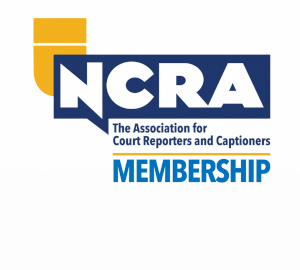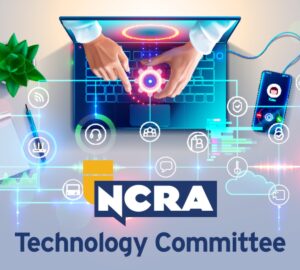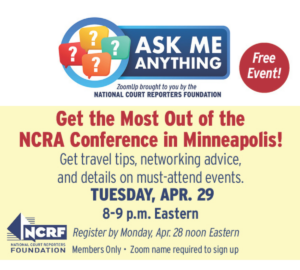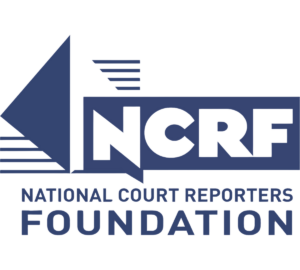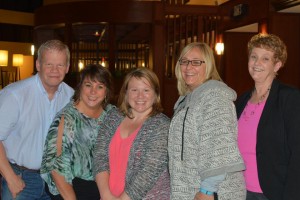
By Jason Meadors
After 30-some years of involvement in various association arenas, from city boards to reporting associations at the state, user group, and national level, I was granted the opportunity in this term to serve on NCRA’s Nominating Committee.
It stands out as one of most rewarding experience in my association career. But let’s keep in mind that the term rewarding can also encompass pain in the process, and not just one’s own pain.
The normal array of nominees for NCRA is for three directors, a term of Secretary-Treasurer (either a new or renewal term), Vice President, and President-Elect. As far as those positions go, this slate comprised a normal year. But in terms candidates’ quality, I can’t help but think it was an outlier, and in the best way possible: Every single nominee was top-notch.
This article won’t go into specific candidates’ names. The committee’s nominations have already been published (at NCRA.org/nominations) and stand on their own. What we’ll do is look at the process and the experience itself, from both sides of the questionnaire.
Imagine sitting in your office and then a loud “thud” startles you as a 10-pound three-ring binder hits the desk. Welcome to the Nominating Committee service. Out of 22 tabs in our committee notebook, a few were organizational things like schedules and background documents (such as the bylaws and the Vision 2018 statement). But most of the tabs were compilations for each candidate. Candidates submitted their nomination documents, résumés, completed questionnaires, and other related information such as referral letters. It was our task to go through these hundreds of pages and wring out some valid analysis.
What does one do when one faces a crowd of outstanding colleagues, with a staggering level of involvement and insight, and has to choose a limited number from those ranks? One goes to the organization’s mission, current-day realities, long-range vision, and the dreaded interview process. And not just of the candidates. We talked to our NCRA President Steve Zinone, RPR; President-Elect Tiva Wood, RDR, CMRS; and Executive Director Mike Nelson, CAE. All of these people were invaluable for their perspectives of board dynamics, the vitality of NCRA, and strategies to strengthen our association.
There are a lot of presumptions, not to mention misconceptions, about the nomination process, and a lot of it has to do with a perceived balance of interests. We were hit many times with the sentiment that we were looking for a certain ratio of freelance principals, freelance reporters, officials, broadcast and CART captioners, educators, females/males, aged/youth, voices of experience/fresh perspectives, regional distributions, state/national involvement, and so on. In a way, I wish we were that smart, to take all those discrete factors that exist within the ongoing board members, factor in those of the new potential members, run the algorithms to get us a blending, and come up with a slate of nominees that would result in a full and balanced diverse spectrum of colleagues to sit as board members.
But we didn’t. Résumés and involvement counted, but they didn’t count for everything. Referral letters counted, but not for everything. Reputation and profile within the industry, reporting talent and accomplishments, native intelligence, business acumen, colleagues’ respect, social grace, political dexterity, and so many other things all counted, but not for everything. We simply looked to the qualities of the candidates we had. And oh, my, what quality we had.
After having a couple weeks to pore over the nomination materials, we started in on interviews. It is no exaggeration to say that after just the very first two, we were already intimidated, if not somewhat depressed. Not because we were hoping for better but because we’d already been hit with such wonderfully talented and eloquent candidates, and we still had all the others to go through. But go through them we did, in a pretty arduous process of being cloistered with each other over a period of several days, from early morning into the evening.
Some of us compared the process, and fairly so, to jury deliberations. Unlike a jury, though, we’re sitting in evaluation of our colleagues. This made our process tougher in a very special way.
In 35 years of association involvement, I’ve come to know a few people. So at the beginning of many interviews, my disclaimer – “You and I are friends, we’ve worked together, played together, presented together, and none of that matters here. I am not your advocate on this committee.” – undoubtedly got quite old for my fellow committee members hearing it repeatedly. But I felt it was necessary, and I said it a lot. And still, when all is said and done, all that high-toned language conflicts with reality the next time that you talk to friends and colleagues who were not selected, and they can’t but help but wonder where the friendship lay during the process.
And like a jury, the committee can second-guess itself forever as to whether the right questions were asked, the correct evaluations rendered, and the right decisions made. We were presented with a wonderful dilemma. We had a limited number of spots to fill, with an abundance of impressive people vying for them, all capable on their own of filling the roles. There were just too many high-quality candidates, which is a great problem for an association to have, but that situation provides its own measure of analysis agony for the committee members.
And that angst on the part of the committee pales in comparison to the pain of the nominees who were not selected, regardless of their qualifications and sincerity, and even including any interview processes in the past that likewise didn’t succeed and add to the anguish.
There’s no question: A role on the NCRA board as director or officer is a heady and self-affirming (if financially burdensome) thing. You’ve gotten the respect of your peers. You’re being looked up to and sought out for your industry information, far-reaching vision, and leadership talents. Your visibility within our industry is ramped up. All your efforts and sacrifices encompassed in your involvement in your local, user group, or national association are hugely validated by your nomination to the NCRA board.
And then the harsh downside. If you’re not selected, it goes the other way: The sense of rejection, the lack of validation, the feeling that you came up short and you can’t even say to yourself if it was through fair or unfair means in that jury-like committee process.
I’ve been through the nomination process before, both successfully and not. I know all too well how glorious it is to be successful. I know how defeating it is to feel you’ve fallen short. I wish there were some way to ease that latter feeling. Very simply, we would have been comfortable with every reporter whom we interviewed having a place at the board table. Also very simply, we couldn’t do that. Receiving that “sorry” call is not a reflection of any lack of quality of the nominee; rather, it’s a reflection of the high quality of every reporter we talked to and an unfortunate consequence of having so many wonderful colleagues from whom we had to choose.
But past the pain of that process for all involved, there was overriding and unquestioned reward out of this year’s Nominating Committee involvement. Unequivocally, yes, our process was studiously fair, devoid of background political or personal considerations, and devoted solely to selection of people, from a pool suffused with high talent, who could best serve NCRA at the board level. Our debate and deliberations were respectful, friendly, incisive, and analytic. They stretched long into the evenings. Our conclusions were reached after thorough consideration.
Thank you to NCRA for its support in this process, to Immediate Past President Sarah Nageotte for her committee leadership, and to President Steve Zinone for his committee appointments and the opportunity to engage in a fantastic, tough, but rewarding process. There is now a group of five colleagues who did not know each other all that well before that weekend in early March and who will now remain close friends for years to come.
And what a delightful thing that is.
Jason Meadors, RPR, CRR, CRC, is a freelance reporter in Fort Collins, Colo., and an occasional contributor to the JCR. He also has fiction titles published for Kindle through Amazon.
